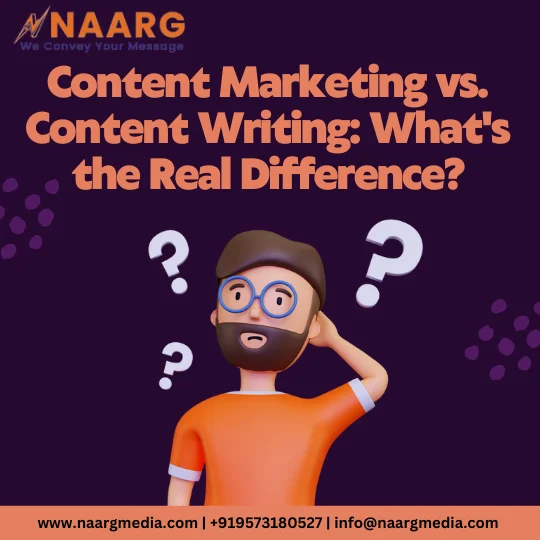Content marketing vs. content writing. These two processes are distinct yet very much interconnected in our digital marketing landscape. Yet somehow we always overlook the difference between content marketing and content writing and consider them to be similar to each other. Many use both of these terms interchangeably, but in reality, they have distinct qualities.
For instance, content marketing is generally about planning, execution, and delivering written content, mostly articles or blog posts, to engage and attract their target audience. On the other hand, content writing is the process of creating valuable and informative written content to achieve similar marketing goals.
Want to learn more about the debate between content marketing vs content writing? Then read this blog, as we are going to discuss it in detail. And we will unravel the key differences between content marketing and content writing.
So, let’s get started.

What is Content Marketing?
By definition, content marketing is the process of creating, planning, and distributing informative and valuable content with the clear aim of acquiring and retaining your target audience.
Depending on your target audience preferences and your business, you can create your content marketing strategy by using a mixture of written, visual, or audio content and even social media content to drive your target audience to take actionable steps that benefit your brand.
Overall you can say that the whole idea of content marketing is to provide value to your target audience for free so that they feel compelled to take advantage of your brand’s products and services.
Key Components of Content Marketing
As you are aware, content marketing is a strategic strategy that focuses on producing and disseminating useful, timely, and consistent material to draw in and keep your target audience and, eventually, generate successful client acquisition. So, we have listed below some key components for a successful content marketing strategy.
1. Audience Understanding and Research
You should have a detailed understanding and representation of your target audience based on your market research and data about your existing customers. It is essential and would be helpful for you to divide your target audience into distinct groups based on their demographics, preferences, and behaviors.
2. Content Strategy
For a perfect content strategy, clear, measurable objectives should be implemented. And you should also assess the existing content to identify opportunities and gaps. You should have a content plan and a roadmap that outlines what type of content you need to create, how often that content needs to be created, and on which platforms it will be published.
3. Content Creation
For content creation, various formats such as blog posts, infographics, videos, and social media posts are considered. Your content should be valuable, informative, and engaging for your target audience. A content calendar is essential so that it helps schedule your content and helps plan and organize content publication to maintain consistency.
What is Content Writing?
Content writing is surely the buzzword in today’s world. But what does content writing mean? In simple terms, content writing is the process of creating content that supports and enhances your content marketing objectives. The goal of a content writer should be to create valuable and high-quality content that can be used in your content marketing as well as your content writing strategy.
All in all you can say that content writing is dependent on content marketing. An interesting fact about content marketing is that marketers are expecting content marketing industry revenue to exceed $135 billion by the year 2026. Content writing is only possible once the content marketing strategy is laid out, and then only a content writer can create strategic content.
Key Components of Content Writing
Content writing is a process that involves creating informative and relevant content to retain a target audience. Listed below are some of the key components you need to keep in mind for effective content writing.
1. A Clear Purpose
Always identify the goals of your content, for instance: is it for information, entertainment, or educational purposes? And ensure that your content aligns with the broader objectives of the target audience and your business.
2. Target Audience
It is essential to understand the demographics, needs, and interests of your target audience. And then tailor your content accordingly to effectively resonate with your specific target audience segment.
3. High-Quality and Relevant Information
Always provide well-researched, accurate, and up-to-date information to use in your content. Outdated information in your content will leave a bad impression on your target audience. So, always use credible sources and data to support your claims for your content.
Key Differences Between Content Marketing and Content Writing
We are all aware that content marketing vs content writing are related in some manner, but they have distinct practices within the field of digital marketing. To help you understand better, listed below are some key differences between the two:
1. Purpose and Goals
Content marketing focuses solely on creating and distributing content to attract, engage, and convert your target audience. It specifically aims to build brand awareness, drive traffic, establish authority, and ultimately increase sales. The content marketing process follows a very strategic process and is goal-oriented.
On the other hand, content writing involves the actual writing of the content, like articles, blog posts, social media posts, and much more. Its main goal is to provide high-quality written content that meets the desired objective that was previously outlined in the content marketing strategy.
2. Scope of Work
Content marketing encompasses a wide range of activities, including content strategy, creation, planning, distribution, and analysis. For content marketing, we use multiple platforms and formats, like blog posts, email newsletters, social media, videos, and podcasts.
Content writing solely concentrates on the creation of the written content, and that too within the framework provided by the content marketing strategy. The content writers write and produce content for different formats, and they make sure it aligns with your marketing strategy and objectives.
3. Strategy and Planning
A comprehensive strategy is required for content marketing that outlines your goals, target audience, distribution channels, and key performance indicators (KPIs). Content marketing is a continuous process of planning, execution, and analysis to improve marketing results over time.
On the other hand, content writing is a process that is guided by strategy, and content writers follow the guidelines provided by the content marketing team. The whole purpose of content writing is to produce content that engages your readers, improves SEO, and encourages your target audience to share the content socially.
Moreover, both of these processes are critical components of content marketing; both can be considered the yin and yang of a digital marketing strategy. And both of these strategies should be used strategically to drive conversions from your target audience.
Elevate your brand with our expert content-writing services. Contact us today to learn more about our services.

